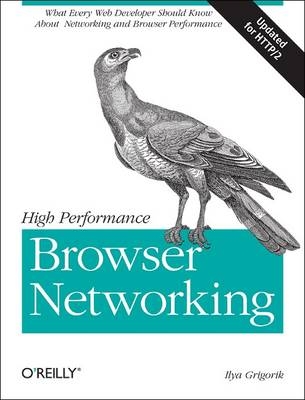
High Performance Browser Networking
O'Reilly Media, Inc, USA (Verlag)
978-1-4493-4476-4 (ISBN)
Author Ilya Grigorik, a web performance engineer at Google, demonstrates performance optimization best practices for TCP, UDP, and TLS protocols, and explains unique wireless and mobile network optimization requirements. You’ll then dive into performance characteristics of technologies such as HTTP 2.0, client-side network scripting with XHR, real-time streaming with SSE and WebSocket, and P2P communication with WebRTC.
- Deliver superlative TCP, UDP, and TLS performance
- Speed up network performance over 3G/4G mobile networks
- Develop fast and energy-efficient mobile applications
- Address bottlenecks in HTTP 1.x and other browser protocols
- Plan for and deliver the best HTTP 2.0 performance
- Enable efficient real-time streaming in the browser
- Create efficient peer-to-peer videoconferencing and low-latency applications with real-time WebRTC transports
Ilya Grigorik is a developer advocate and web performance engineer at Google. He spends his days and nights working on making the web faster and building and driving adoption of performance best practices. Prior to focusing on web performance Ilya was the founder and CTO of PostRank, a social analytics company which was acquired by Google and became the core of social analytics reporting within Google Analytics. Whenever not thinking web performance, or analytics, Ilya can be found contributing to open-source projects, reading, or building fun projects like VimGolf, GitHub Archive and others.
Networking 101
Chapter 1 Primer on Latency and Bandwidth
Speed Is a Feature
The Many Components of Latency
Speed of Light and Propagation Latency
Last-Mile Latency
Bandwidth in Core Networks
Bandwidth at the Network Edge
Delivering Higher Bandwidth and Lower Latencies
Chapter 2 Building Blocks of TCP
Three-Way Handshake
Congestion Avoidance and Control
Bandwidth-Delay Product
Head-of-Line Blocking
Optimizing for TCP
Chapter 3 Building Blocks of UDP
Null Protocol Services
UDP and Network Address Translators
Optimizing for UDP
Chapter 4 Transport Layer Security (TLS)
Encryption, Authentication, and Integrity
TLS Handshake
TLS Session Resumption
Chain of Trust and Certificate Authorities
Certificate Revocation
TLS Record Protocol
Optimizing for TLS
Performance Checklist
Testing and Verification
Performance of Wireless Networks
Chapter 5 Introduction to Wireless Networks
Ubiquitous Connectivity
Types of Wireless Networks
Performance Fundamentals of Wireless Networks
Measuring Real-World Wireless Performance
Chapter 6 WiFi
From Ethernet to a Wireless LAN
WiFi Standards and Features
Measuring and Optimizing WiFi Performance
Optimizing for WiFi Networks
Chapter 7 Mobile Networks
Brief History of the G’s
Device Features and Capabilities
Radio Resource Controller (RRC)
End-to-End Carrier Architecture
Packet Flow in a Mobile Network
Heterogeneous Networks (HetNets)
Real-World 3G, 4G, and WiFi Performance
Chapter 8 Optimizing for Mobile Networks
Preserve Battery Power
Eliminate Periodic and Inefficient Data Transfers
Anticipate Network Latency Overhead
Design for Variable Network Interface Availability
Burst Your Data and Return to Idle
Offload to WiFi Networks
Apply Protocol and Application Best Practices
HTTP
Chapter 9 Brief History of HTTP
HTTP 0.9: The One-Line Protocol
HTTP 1.0: Rapid Growth and Informational RFC
HTTP 1.1: Internet Standard
HTTP 2.0: Improving Transport Performance
Chapter 10 Primer on Web Performance
Hypertext, Web Pages, and Web Applications
Anatomy of a Modern Web Application
Performance Pillars: Computing, Rendering, Networking
Synthetic and Real-User Performance Measurement
Browser Optimization
Chapter 11 HTTP 1.X
Benefits of Keepalive Connections
HTTP Pipelining
Using Multiple TCP Connections
Domain Sharding
Measuring and Controlling Protocol Overhead
Concatenation and Spriting
Resource Inlining
Chapter 12 HTTP 2.0
History and Relationship to SPDY
The Road to HTTP 2.0
Design and Technical Goals
Brief Introduction to Binary Framing
Chapter 13 Optimizing Application Delivery
Evergreen Performance Best Practices
Optimizing for HTTP 1.x
Optimizing for HTTP 2.0
Browser APIs and Protocols
Chapter 14 Primer on Browser Networking
Connection Management and Optimization
Network Security and Sandboxing
Resource and Client State Caching
Application APIs and Protocols
Chapter 15 XMLHttpRequest
Brief History of XHR
Cross-Origin Resource Sharing (CORS)
Downloading Data with XHR
Uploading Data with XHR
Monitoring Download and Upload Progress
Streaming Data with XHR
Real-Time Notifications and Delivery
XHR Use Cases and Performance
Chapter 16 Server-Sent Events (SSE)
EventSource API
Event Stream Protocol
SSE Use Cases and Performance
Chapter 17 WebSocket
WebSocket API
WebSocket Protocol
WebSocket Use Cases and Performance
Performance Checklist
Chapter 18 WebRTC
Standards and Development of WebRTC
Audio and Video Engines
Real-Time Network Transports
Establishing a Peer-to-Peer Connection
Delivering Media and Application Data
DataChannel
WebRTC Use Cases and Performance
Performance Checklist
Index
Colophon
| Erscheint lt. Verlag | 29.10.2013 |
|---|---|
| Zusatzinfo | black & white illustrations |
| Verlagsort | Sebastopol |
| Sprache | englisch |
| Maße | 178 x 233 mm |
| Gewicht | 649 g |
| Einbandart | kartoniert |
| Themenwelt | Informatik ► Web / Internet ► Web Design / Usability |
| ISBN-10 | 1-4493-4476-3 / 1449344763 |
| ISBN-13 | 978-1-4493-4476-4 / 9781449344764 |
| Zustand | Neuware |
| Haben Sie eine Frage zum Produkt? |
aus dem Bereich


